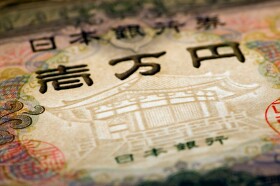The Japanese yen is strengthening against several currencies on Thursday, despite plenty of weak data suggesting that the worldâs third-largest economy could be cooling down. The yen might be gaining steam on two things: expectations that the central bank could follow the Federal Reserveâs lead and slash interest rates or breathe a sigh of relief that the US and China have renewed trade talks.
The Ministry of Economy, Trade, and Industry released the latest reading for its Tertiary Industry Index, a measurement of domestic services activity. In June, the index contracted 0.2%, down from the 0.8% gain in May. This was also below the median estimate of a 0.1% drop.
According to the Ministry of Finance, foreign bond investment by Japanese investors jumped $2.75 billion in the week ending July 6. This represents the sixth consecutive week of gains â it contracted in the final week of May.
In the same report, it was reported that stock investment by foreigners in Japan surged by just under $2 billion in the same time frame, which is the second straight month of increases. However, between the middle of May and the end of June, foreign stock investment had tumbled by as much as $3 billion.
This comes as the Bank of Japan (BOJ) reported that the producer price index (PPI) slipped 0.1% in June, following a 0.6% increase in the previous month. The market had forecast a 0.4% boost.
The biggest piece of data this week was weak machine orders. Last month, machine tool purchases cratered 38%, higher than the 27.3% plunge in May.
Despite the bearish data, there is strong sentiment regarding the yen.
One trend that investors are excited about is that US-China trade negotiations are back on. This is a positive step for the regional economy and potentially a signal that Washington and Tokyo can work out a trade agreement that can benefit both sides. At the same time, the yen, which has been considered a safe-haven asset for years, can still gain on geopolitical tensions, should there be another falling out between the worldâs two economic superpowers.
Moreover, the central bank might further ease monetary policy after the Fed suggested that it will cut interest rates in the near future to facilitate economic growth. With the BOJ already averring that it is ready to accommodate, traders believe this could prevent Tokyo from riding off a cliff and slipping into a recession.
The USD/JPY currency pair tumbled 0.35% to 108.07, from an opening of 108.46, at 12:22 GMT on Thursday. The EUR/JPY dipped 0.09% to 121.92, from an opening of 122.02.
If you have any questions, comments, or opinions regarding the Japanese Yen, feel free to post them using the commentary form below.
Japanese Yen Strengthens Despite Plenty of Unfavorable Data
